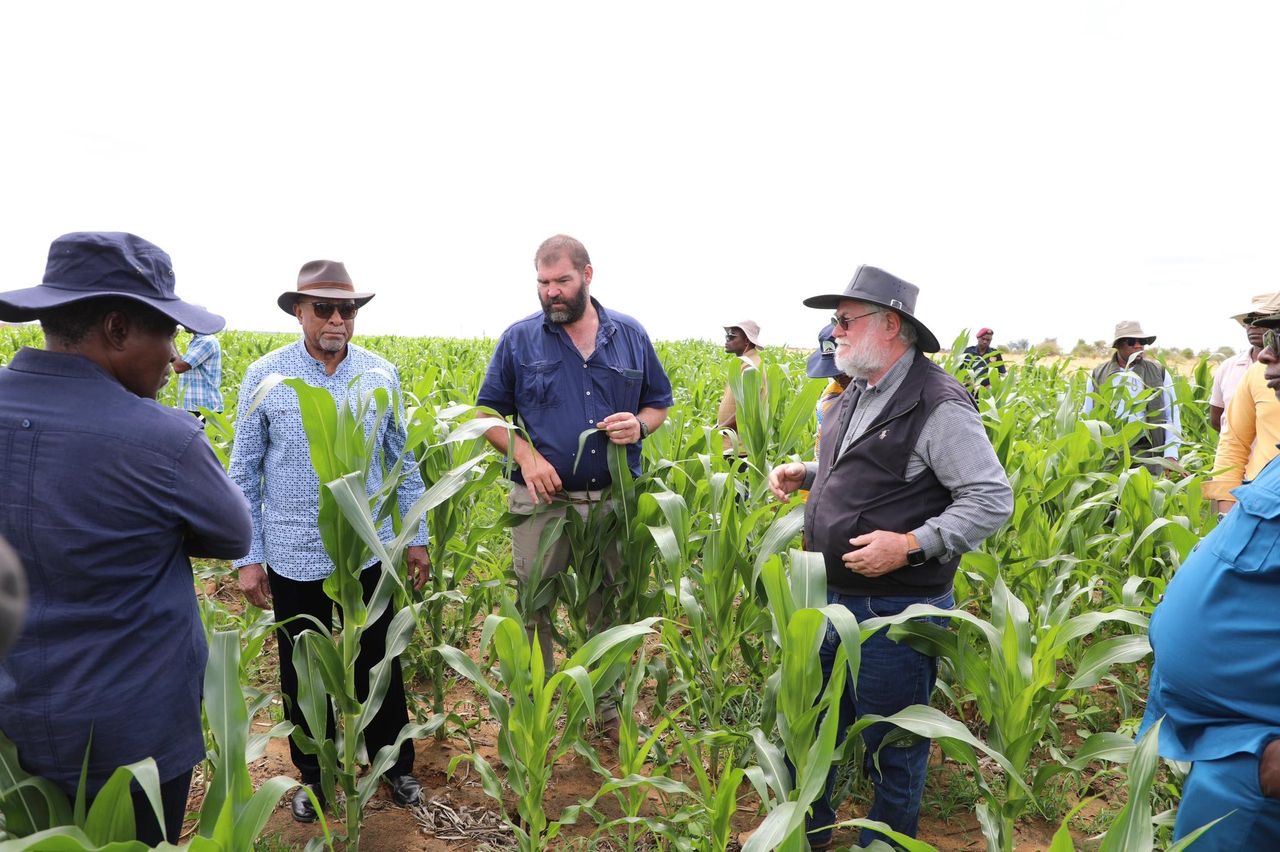THE use of fronts to conceal ownership in companies that benefit from the Ministry of Fisheries’ black empowerment scheme is illegitimate, says Minister Abraham Iyambo.
Iyambo’s statement comes at a time when there are increasing indications of the use of proxies in the industry. The Fisheries and Marine Resources Minister, who stopped short of declaring the practice illegal, said he would not recognise anyone who had hidden behind another person as the actual owner of shares in a company with fishing rights.”We do not recognise proxies or nominees,” said Iyambo when approached for comment on Thursday.”What is recognised at the moment is what is stated in the application…a nominee application will not even go through.”Concealed ownership deals have begun to unravel in several companies, with revelations that well-known figures in business, politics and Government used relatives, lovers, spouses and communities in an attempt to improve their chances of getting fishing rights and quotas.But Utoni Nujoma, the President’s son, yesterday dismissed attempts to solicit comment about his use of a proxy and on how he got involved in a firm.”What do you want? Voetsek (go to hell, get lost) man,” said Nujoma, the Government’s Human Rights Commissioner, before switching off his cell phone.Many firms were apparently hastily set up to take advantage of the Ministry’s move to group black-owned firms (that had no capital) with white organisations experienced in the fishing industry.Iyambo’s statement could well open up a can of worms if those who were used as fronts were to insist on keeping the shares for themselves.The Ministry’s empowerment scheme of 2000 was described in some quarters as a form of nationalisation as established firms were forced to cede their assets to newcomers.Some of the aspiring newcomers at the time criticised the scheme as largely aimed at enriching a black elite.Supreme Court Judge Pio Marapi Teek has been accused in court papers of using his 16-year-old daughter to conceal his part-ownership in ‘Old Man Fishing’.He has denied that he owns the shares, though he is the legal guardian of Pia Mbemurukira Kazenango and a representative of the company that is involved in a pending legal dispute with its founder Benjamin Kheibeb.The practice of using proxies emerged again last week in a fight among shareholders of Tega Fishing, a company that was given fishing rights under a consortium called Omenkete Investments.The company received fishing rights when it first applied as Atlantic Fisheries.According to papers at the Ministry of Fisheries, its owners are: Tsumkwe/Gam Trust with 25 per cent share ownership; Dobe Trust (10 per cent); Manuel Kakujaha (7 per cent); Onesmus Thobias Amadhila (7 per cent); Daniel Haitembu (7 per cent); MacAlbert Hengari (7 per cent); Veovisa Ngombe Katengua (7 per cent); Graham Duffus (10 per cent); Dirk Theart (10 per cent).The remaining 10 per cent of the shares are held in company reserves.But some of the shareholders have accused Ella Ndatega Kamanya, the founder of the first company (and after whom Tega Fishing is named), and her brother-in-law, Daniel Haitembu, of having used the San and Gam’s Herero communities to obtain fishing rights.They claimed Kamanya changed the company name and share ownership without their approval and that she has failed to account for N$2,4 million of dividends that Tega Fishing had received from Omankete Investments.Shareholders such as Hengari have insisted that Kamanya and her brother-in-law flouted company rules and paid themselves dividends based on shares they allocated themselves and not according to what they had submitted to the Ministry of Fisheries.Kamanya last week accused three shareholders of trying to push her out of the company she started.She also confirmed that she and Kazenambo Kazenambo had used proxies.”Onesmus Thobias Amadhila, who was a boyfriend of mine and was standing in for me, Ja,…he was my proxy,” she said, adding that she had used a nominee because of prejudice she could face as a single, short and petite woman.Amadhila, husband of Finance Minister Saara Kuugongelwa-Amadhila, on Friday claimed he had legitimately acquired the shares himself.He was, however, unable to explain how he had met Duffus and Theart, who, Kamanya said, owned Atlantic Fisheries.Kamanya had introduced them to the rest of the shareholders.Kamanya also said it “was clear” to Iyambo that some shares were hers “because I’m the one who was campaigning for the rights to begin with”.Katengua is a front for, and grandmother of Kazenambo Kazenambo, a former Government official now at Namibia Wildlife Resorts.Kazenambo said he chose her because he was out of the country to pursue his studies in the United Kingdom.But papers in possession of The Namibian show he personally signed for money he received as dividends or loans.Similarly, Kakujaha, who is a proxy for Utoni Nujoma, appears to be only a front.Some documents indicate Haitembu, Kamanya, Nujoma and Kazenambo had attended meetings where ownership was changed.Helvi M Nujoma, believed to be Utoni’s daughter, was given Kakujaha’s seven per cent.Amadhila’s shares were reduced to five, Hangari’s was slashed to two and Kazenambo, Kamanya and Haitembu’s were each increased to 17 per cent.A Kriat Kamanya joined the owners.Iyambo last year indicated that he was unhappy with the way the shareholders had tried to change ownership.Despite maintaining that he was happy with the way the black empowerment scheme was going, the Minister confirmed he had received several complaints about the way money was shared in the companies.”I have heard there are some people who want to outmanoeuvre others,” said Iyambo.He said he had called them to his office to remind them of the reasons behind the empowerment programme.”Shareholding should not be token,” he said of reports that some companies do not share dividends with the communities that they had nominated and then made donations in the guise of “social responsibility”.Hengari, the Tega shareholder, said: “There is certainly a need for greater surveillance by the Ministry of Fisheries.And it is not just the fishing sector.It is happening in other sectors where greedy individuals negate the principle of black economic empowerment.”Many such companies were mere shells that received dividends.Iyambo said it was the responsibility of shareholders to get more involved in the industry because the idea of empowerment included far more than just receiving payments when the company generated income.The Fisheries and Marine Resources Minister, who stopped short of declaring the practice illegal, said he would not recognise anyone who had hidden behind another person as the actual owner of shares in a company with fishing rights.”We do not recognise proxies or nominees,” said Iyambo when approached for comment on Thursday.”What is recognised at the moment is what is stated in the application…a nominee application will not even go through.”Concealed ownership deals have begun to unravel in several companies, with revelations that well-known figures in business, politics and Government used relatives, lovers, spouses and communities in an attempt to improve their chances of getting fishing rights and quotas.But Utoni Nujoma, the President’s son, yesterday dismissed attempts to solicit comment about his use of a proxy and on how he got involved in a firm.”What do you want? Voetsek (go to hell, get lost) man,” said Nujoma, the Government’s Human Rights Commissioner, before switching off his cell phone.Many firms were apparently hastily set up to take advantage of the Ministry’s move to group black-owned firms (that had no capital) with white organisations experienced in the fishing industry.Iyambo’s statement could well open up a can of worms if those who were used as fronts were to insist on keeping the shares for themselves.The Ministry’s empowerment scheme of 2000 was described in some quarters as a form of nationalisation as established firms were forced to cede their assets to newcomers.Some of the aspiring newcomers at the time criticised the scheme as largely aimed at enriching a black elite.Supreme Court Judge Pio Marapi Teek has been accused in court papers of using his 16-year-old daughter to conceal his part-ownership in ‘Old Man Fishing’.He has denied that he owns the shares, though he is the legal guardian of Pia Mbemurukira Kazenango and a representative of the company that is involved in a pending legal dispute with its founder Benjamin Kheibeb.The practice of using proxies emerged again last week in a fight among shareholders of Tega Fishing, a company that was given fishing rights under a consortium called Omenkete Investments.The company received fishing rights when it first applied as Atlantic Fisheries.According to papers at the Ministry of Fisheries, its owners are: Tsumkwe/Gam Trust with 25 per cent share ownership; Dobe Trust (10 per cent); Manuel Kakujaha (7 per cent); Onesmus Thobias Amadhila (7 per cent); Daniel Haitembu (7 per cent); MacAlbert Hengari (7 per cent); Veovisa Ngombe Katengua (7 per cent); Graham Duffus (10 per cent); Dirk Theart (10 per cent).The remaining 10 per cent of the shares are held in company reserves.But some of the shareholders have accused Ella Ndatega Kamanya, the founder of the first company (and after whom Tega Fishing is named), and her brother-in-law, Daniel Haitembu, of having used the San and Gam’s Herero communities to obtain fishing rights.They claimed Kamanya changed the company name and share ownership without their approval and that she has failed to account for N$2,4 million of dividends that Tega Fishing had received from Omankete Investments.Shareholders such as Hengari have insisted that Kamanya and her brother-in-law flouted company rules and paid themselves dividends based on shares they allocated themselves and not according to what they had submitted to the Ministry of Fisheries.Kamanya last week accused three shareholders of trying to push her out of the company she started.She also confirmed that she and Kazenambo Kazenambo had used proxies.”Onesmus Thobias Amadhila, who was a boyfriend of mine and was standing in for me, Ja,…he was my proxy,” she said, adding that she had used a nominee because of prejudice she could face as a single, short and petite woman.Amadhila, husband of Finance Minister Saara Kuugongelwa-Amadhila, on Friday claimed he had legitimately acquired the shares himself.He was, however, unable to explain how he had met Duffus and Theart, who, Kamanya said, owned Atlantic Fisheries.Kamanya had introduced them to the rest of the shareholders.Kamanya also said it “was clear” to Iyambo that some shares were hers “because I’m the one who was campaigning for the rights to begin with”.Katengua is a front for, and grandmother of Kazenambo Kazenambo, a former Government official now at Namibia Wildlife Resorts.Kazenambo said he chose her because he was out of the country to pursue his studies in the United Kingdom.But papers in possession of The Namibian show he personally signed for money he received as dividends or loans.Similarly, Kakujaha, who is a proxy for Utoni Nujoma, appears to be only a front.Some documents indicate Haitembu, Kamanya, Nujoma and Kazenambo had attended meetings where ownership was changed.Helvi M Nujoma, believed to be Utoni’s daughter, was given Kakujaha’s seven per cent.Amadhila’s shares were reduced to five, Hangari’s was slashed to two and Kazenambo, Kamanya and Haitembu’s were each increased to 17 per cent.A Kriat Kamanya joined the owners.Iyambo last year indicated that he was unhappy with the way the shareholders had tried to change ownership.Despite maintaining that he was happy with the way the black empowerment scheme was going, the Minister confirmed he had received several complaints about the way money was shared in the companies.”I have heard there are some people who want to outmanoeuvre others,” said Iyambo.He said he had called them to his office to remind them of the reasons behind the empowerment programme.”Shareholding should not be token,” he said of reports that some companies do not share dividends with the communities that they had nominated and then made donations in the guise of “social responsibility”.Hengari, the Tega shareholder, said: “There is certainly a need for greater surveillance by the Ministry of Fisheries.And it is not just the fishing sector.It is happening in other sectors where greedy individuals negate the principle of black economic empowerment.”Many such companies were mere shells that received dividends.Iyambo said it was the responsibility of shareholders to get more involved in the industry because the idea of empowerment included far more than just receiving payments when the company generated income.
Stay informed with The Namibian – your source for credible journalism. Get in-depth reporting and opinions for
only N$85 a month. Invest in journalism, invest in democracy –
Subscribe Now!










